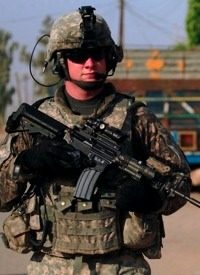
On August 31 President Barack Obama announced that “the American combat mission in Iraq has ended.”
The last officially designated combat troops were withdrawn on August 18. Within days an American soldier was killed in a rocket attack.
On September 5, U.S. troops participated in a battle between suicide bombers and Iraqi forces in which 12 people were killed and 36 wounded. The bombers attacked an army base in Baghdad “in broad daylight,” according to Reuters, which reported that the “U.S. military said its troops opened fire and provided air support for Iraqi forces during the gunbattle.”
The dictionary defines combat in the military sense as “active, armed fighting with enemy forces.” If these battles do not qualify as combat, what does?
They also qualify as an excuse for Obama to keep troops in Iraq well beyond the end of 2011, which is clearly what all the movers and shakers in the U.S. government and the Council on Foreign Relations want.
Agence France Presse, in fact, reported the day before the latest “non-combat” battle that “American officials privately acknowledge that the US military presence in Iraq will almost certainly be extended” beyond 2011, with “thousands of troops” necessary “to keep a lid on sectarian tensions and to bolster Baghdad’s fledgling military.”
“Baghdad’s military,” writes AFP, “remains heavily dependent on US logistical support, air power, equipment and expertise” — as seen in Sunday’s attack — “while most Baghdad politicians are anxious to retain American troops as a peacekeeping force in reserve.”
The New American reported on August 31 that CFR senior fellow Noah Feldman had penned a column for the Wall Street Journal arguing that Iraq’s difficulties “point to the need for a continuing U.S. role in security and beyond” — possibly for 35 years or longer.
AFP quotes another CFR senior fellow, Stephen Biddle, who claims that U.S. troops must remain in Iraq to prevent sectarian rivalries from flaring up: “What you’re trying to do is make the size of the troop presence proportional to the residual fear that the groups feel towards each other.”
The number of troops could shrink to “roughly 10,000,” according to several former military officers who spoke to AFP; and John Ballard, a professor at National Defense University and a retired army officer, suggested the number could be “even less than 10,000 and still be viable.” “Vice President Joe Biden’s national security advisor, Anthony Blinken, has said only ‘dozens or maybe hundreds’ of troops could remain,” says AFP, noting that this is part of the Obama administration’s “play[ing] down the possibility of a large US force.”
“But,” writes AFP, “Iraqi army chief of staff General Babaker Zebari told AFP last month that his country’s forces would require US support for another decade, while some analysts in Washington argue for keeping about half of the current force after 2011.”
Among those analysts is CFR President Richard Haass, described by AFP as “a top diplomat during George W. Bush’s presidency,” thus giving a bipartisan flavor to the calls for a more or less permanent U.S. presence in Iraq. AFP quotes a September 1 article by Haass in which he argues that Iraq’s “leaders are likely to ask that tens of thousands of American troops stay on for an extended period.” Haass adds: “There is a strong case that the United States should be prepared to do so.”
AFP explains that post-2011, the U.S. military “would provide some fire power, helicopters, fighter jets to defend a country with virtually no air force, naval defenses for ports and coveted intelligence collected from unmanned robotic planes.” It would also provide “special forces assisting Iraqis in manhunts of Al-Qaeda figures” and assistance in “possible worst-case scenarios.” Moreover, there will be “thousands of private contractors to take up security duties formerly performed by troops.” Thank goodness combat is over!
With its government still in a state of turmoil six months after the election, the report says, reaching any status-of-forces agreement will “present a delicate political challenge for Iraq, as leaders there privately back a continued presence [of U.S. troops] but are reluctant to publicly endorse it.” Never fear, however: The 2008 agreement “was negotiated under a shroud of secrecy,” Ballard told AFP, “and a follow-on mission also would have to be agreed discreetly, perhaps without a detailed, long-term agreement.”
Conveniently, such secret pacts also keep the American people in the dark, allowing their government’s plans to proceed apace while many voters, along with AFP, continue to be gulled into thinking that Obama is “keen to wind down the US role in Iraq.”
The Iraq war is an unconstitutional disaster — perhaps “the greatest strategic disaster in our history,” as the late Lt. Gen. William E. Odom described it. Now is not the time to consider keeping the troops mired in the sands of Mesopotamia for years to come; nor is it the time to keep them there another 16 months under the guise of “advise and assist” rather than “combat.” Now is the time to withdraw all troops posthaste — and then to start dismantling the rest of the American empire.
Photo of U.S. soldier on patrol in Iraq on September 1, one day after America's combat role had officially ended: AP Images


